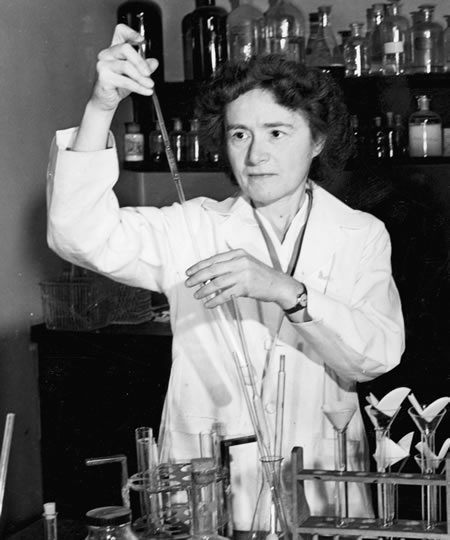 |
| “Widely lauded, Cori was the first American woman and the third worldwide to win the Nobel Prize.” |
Gerty Theresa Cori was born August 15, 1896, in Prague, Austria. She received her university education at the Tetschen Realgymnasium (1914) and her medical degree from German University of Prague in 1920. She spent two years at the Carolinen Children’s Hospital. Due to rising anti-Semitism in Europe, she emigrated with her husband, Carl Ferdinand Cori, to the United States. She became a naturalized U.S. citizen in 1928.
For 35 years, the Coris formed a close scientific partnership. Focusing on the intermediary metabolism of carbohydrates, they discovered glucose-1-phosphate (Cori ester) and the cyclic nature of glycogen breakdown and re-formation (Cori cycle). They were pioneers in the study of both enzymes and hormones, and their work had major implications throughout science and medicine. In 1947, Gerty and Carl Cori were awarded the Nobel Prize in physiology or medicine. Besides themselves, their lab produced six Nobel Prize winners.
After emigrating, Cori became an assistant pathologist at the State Institute for the Study of Malignant Diseases in Buffalo, New York. She then held the positions of fellow and research associate in pharmacology and biochemistry at Washington University School of Medicine. In 1944, she became associate professor of pharmacology, and in 1947 achieved the rank of full professor in the Department of Biological Chemistry.
Cori was the recipient of many additional awards and prizes, including election to the National Academy of Sciences. In 1952, President Harry S Truman named her to the National Science Board of the National Science Foundation.
As the first American woman and the third worldwide to win the Nobel Prize, Gerty Theresa Cori has been widely lauded. Her achievement is all the more remarkable given that for more than half of her career, she was marginalized in non-tenure track research positions at token salaries. Despite rampant gender discrimination and nepotism rules, she never stopped pursuing her lifelong interest in medical research. Brilliant and quick-witted, Cori was a superb experimentalist as well as a perfectionist.
| “Women …of the early part of the 20th century faced enormous difficulties and frustrations. They were told at every turn that they did not belong in science. Most felt lucky if they found positions working as research assistants to established male scientists that provided…a modest income and an opportunity to work in a laboratory. Some worked as unpaid volunteers or as assistants to their husbands. |
| The Door in the Dream by Elga R. Wasserman Joseph Henry Press, 2000 |
Her insatiable curiosity and enthusiasm for research were infectious. She was a voracious reader; incoming journals went first to her and then to the library.
Focused and hard-driving, Cori was a tireless worker.
Once when samples were lost and an experiment had to be repeated, she snapped, “That was a whole day wasted!” Despite being afflicted with a fatal anemia, if she wasn’t in the hospital, she was in the lab.
Sympathetic to other women in research Cori ensured that they were elected into their professional societies and cheered for their first professional seminars. She once sent her own housekeeper to pinch-hit for a colleague’s missing babysitter. An inspirational role model, she paved the way for many future women in science.
